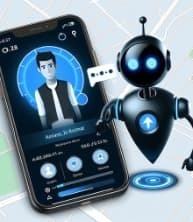Your AI Update - February 2024

Keep up with recent news in the world of Generative AI, including new features, AI in the workplace, social and ethical implications, regulations, and research revelations from the past month (15m read).
Tech Titans: New Features, Products, and More
Sora: The ChatGPT of Video Generation

In a groundbreaking step forward on Generative AI’s frontier, OpenAI, the makers of ChatGPT, announced their new project: Sora, a video generator with text-to-video capabilities that looks to be head and shoulders above the quality of existing text-to-video products. While existing products from Stability.ai, Runway, and Google’s Lumiere are limited to just a few seconds of video and often have a very nearly static appearance, Sora looks like it is generating 60-second videos with hyper-realism. Although not yet available for public use, OpenAI CEO Sam Altman responded to user requests on X to demonstrate its capabilities. To see its groundbreaking work, check out OpenAI’s Official ‘Sora’ Demo video posted to YouTube last Saturday. Some speculate that this announcement wasn’t necessarily indicative of a nearly market-ready product, but rather an early, “peek inside the lab,” strategic move to overshadow Google’s launch of Gemini.
Read more about the new project and OpenAI’s commitments to safety/security on the company’s announcement page.
The Google Suite Matures
Google has had a monumental first half of February, overshadowed only by OpenAI’s announcement of Sora. In a major move, the company updated its flagship language tool Bard to ‘Gemini’ - not just a rebrand, but a new multi-modal, holistic artificial intelligence tool and ‘digital brain,’ with web browsing, image generation, and language capabilities. A major technical advance was announced in which Gemini is reported to have a 1 million token context window versus the 128k for ChatGPT Turbo and 200k for Claude, both competing systems. The context window is the amount of information that the system can consider at one time and is an important determinant of a system’s ability to deal with more complex problems. This is a dramatic shift in system capabilities that may have significant implications for improving language and multimodal systems going forward.
Accompanying the new product, Google immediately released a free app and premium subscription service (w/first 2 months free). Currently, three versions of Gemini are available: Nano, Pro, and Ultra. Gemini Pro is a simple rebrand of the existing Bard chatbot, with the same capabilities and a refreshed look. To use the advanced versions, users must subscribe to Google One AI Premium for $19.99/mo. Google executives anticipate Gemini to supersede the longstanding Google voice assistant, becoming the primary method for users to employ the technology in tasks related to thinking, planning, and creating, aligning with the company's foundational mission to organize the world's information and make it universally accessible and useful. On another note, gen AI capabilities are coming to Google Maps, image creation is now possible on mobile devices with MobileDiffusion, and Lumiere text-to-video/image creator joins the Gemini umbrella.
Microsoft Leading the Charge on Cheaper AI
Microsoft has formed an internal team dedicated to the advancement of ‘cheaper AI.’ Some core elements of this strategy are beginning to materialize, including but not limited to (1) distancing themselves from OpenAI, and (2) investing in the development of small language models (SLMs). Small language models are an interesting emerging topic in the field, as they are significantly cheaper to operate and require less storage to run. Regarding their partnership with OpenAI, the startup has demonstrated a commitment to high-quality but high-cost products. At the same time, Microsoft has the market share and name recognition to successfully divest from their loyal partner if they choose to commit to cheaper products. This month Office365 topped 400 million paid users, with much of the credit going to the integration of Copilot AI. Prices of consumer-facing AI products like assistants, chatbots, and image creators have proven to be a significant barrier to entry for consumers, with many users of Copilot in particular (and also across the board) deciding the extra subscription fee isn’t worth the money. With competitor Google underscoring their announcement of Gemini with a $20/mo subscription fee, it remains to be seen how this new strategy will impact market share in the increasingly competitive generative AI product space.
Read more about…
-
…what we know of Apple’s work in Gen AI: What is Apple’s generative AI strategy?
-
…the next player in the game, backed by Amazon: Anthropic’s Unusual $750 Million Fundraise
AI at Work: Novel Uses, Recommendations and Impact on Labor
Otter.ai, Never Take Meeting Notes Again

Otter.ai, which sells itself as an AI-powered, productivity platform, released its latest package dubbed "Meeting GenAI." The platform explains that through AI-driven voice transcription services, Otter.ai can generate summaries and answer questions about specific meetings. Bary Collins, a Forbes tech writer, reviewed Otter.ai and was impressed that multiple users within an organization can interact with the assistant simultaneously. Moreover, Collins notes that Otter refines its AI capabilities to improve summarization quality and reduce the risk of errors, ensuring accurate and insightful meeting notes. While Otter's “Meeting GenAI” raises privacy concerns regarding the storage and access to sensitive meeting data, the platform restricts access to authorized users only. As reported by TechCrunch, Otter.ai does not use customers’ data to train AI models without their permission, allowing individual users to decide whether to share their recordings. While Otter’s “Meeting GenAI” undoubtedly accelerates business processes, it is important to be aware of the privacy tradeoffs at hand.
Looming AI Misinformation Concerns Facing 2024 Election
In preparation for the 2024 election, the utilization of AI for fraudulent dissemination of misinformation has emerged as a significant concern and some companies are working to address the problem. As reported by NBC News, Laura Edelson, a co-leader of Cybersecurity for Democracy at Northeastern University, warns that generative AI increases the spread of misinformation and harassment of public figures and entities. Edelson urges AI platforms to build new tools to mitigate the effects of disinformation that has the power to influence election results. As reported by the New York Times, Nick Clegg, President of Global Affairs at Meta, emphasized at the World Economic Forum in Davos that the detection of artificially generated content is the most urgent task confronting the tech industry. While Clegg expresses optimism in rapidly detecting AI-generated images, challenges persist in extending this capability to video and audio content produced by various software, posing a significant threat as the election approaches. Reality Defender, a prominent deepfake detection company, says that it employs AI algorithms trained with a combination of authentic and artificially generated media to discern between genuine and AI-generated content.. However, skepticism remains regarding the effectiveness of current detection tools, as highlighted by Neil Zhang, a machine learning researcher at the University of Rochester, who notes the absence of benchmarks and a funding disparity between deepfake creation and detection technologies.
OpenAI’s ChatGPT Alternative: “For Business”
ChatGPT Enterprise, a version of the popular ChatGPT, is tailored for businesses and organizations. OpenAI describes ChatGPT Enterprise as a “step towards an AI assistant for work” with Advanced Data Analysis capabilities that allow ChatGPT to analyze data, generate charts, solve math problems, and more. Powered by GPT-4, ChatGPT Enterprise boasts faster performance than non-enterprise users and extended context windows for processing longer inputs. With enterprise-grade protection and privacy measures, including the assurance that proprietary data won't be used for training or service improvement, OpenAI addresses corporate concerns about data security. Moreover, the introduction of memory features enables ChatGPT to remember user preferences, which OpenAI predicts will contribute to more personalized and efficient interactions for Enterprise users.
Read more about…
-
…how small businesses are implementing AI: The Essence Of A Great AI Solution For SMBs
-
…the blueprint for AI integration in business: How Companies Are Starting to Use Generative AI to Improve Their Businesses
AI in the World: Shaping Lifestyles and Society
AI Tools for College Application Essays
Universities are currently in the process of evaluating the first full academic round of college applications wherein all students have access to AI generation tools. In an effort to assess the difference between AI-generated essays and those composed before the advent of ChatGPT,The Washington Post asked a prompt engineer to create college essays using ChatGPT and showed them to Adam Nguyen, a former Ivy League college admissions counselor. According to The Washington Post, Nguyen has experience advising students at Harvard University and reading application essays at Columbia University. College admissions officers have noted that AI-generated essays have some “easy tells.” These AI-generated essays often use generic answers about academic work and extracurricular activities and may even fabricate part of the application to produce information an“admissions reviewer would want to read.” Nguyen also notes how ChatGPT is notorious for adding blanket statements that seem unoriginal. Furthermore, admissions officers also note that ChatGPT tends to “produce content on issues of race, sex or socioeconomic status, they often employ stereotypes.” This is important because relying on AI beyond inspiration or brainstorming can lead to essays that misrepresent an applicant’s personal experiences and fail to reflect the applicant’s identity.
Google Maps: “Vibe” Searching using AI

Google Maps has introduced users to a new generative AI feature that (1) facilitates the discovery of new places and (2) enables highly targeted searches. According to a recent update on Google’s blog, the LLM behind this update can analyze “more than 250 million places and trusted insights from our community of over 300 million contributors” for quick and efficient suggestions. The update also encourages a more conversational relationship between the user and Google Maps. The blog uses the example of an individual who wants to find a thrift shop in the San Francisco area and can search broadly for “places with a vintage vibe in SF.” Maps will gather information about nearby locations and present photos and reviews. This is also extremely useful if a user is feeling indecisive or needs a quick change of plans, making it a versatile tool for local trips or vacation itinerary planning. This AI-enabled feature also enables people to more easily discover places alone or with friends. Google states that the AI update can tackle even the most niche searches. The company intends to start testing the feature more in the US before making it globally available.
AI Helping Teachers
AI-generated lesson plans for K-12 educators is gaining popularity worldwide. Researchers at the University of Technology Sydney surveyed over 330 educators in the US, Australia, and several EU countries, where 4 out of 5 K-12 educators noted that a “ChatGPT-generated lesson plan would be effective.” Furthermore, at least 71% of K-12 educators assert that ChatGPT lesson plans were more specific than their non-AI-aided course outline. According to the Royal Society of Chemistry, good teachers will be “adapting the output for their curriculum.” Colin McGill, a lecturer at Edinburgh Napier University believes that it would be naive to assume that student teachers will not be utilizing AI tools and is taking the opportunity to illustrate the importance of leveraging AI critically. McGill asks his student teachers to generate a lesson plan and then explain ways it can be improved or more customized to their students. Understanding how AI is integrated into everyday lessons ensures that AI technologies are implemented in a way that maximizes their benefits while mitigating potential risks or drawbacks in education.
Read more about…
-
…AI calling the shots in healthcare: Artificial intelligence is making critical healthcare decisions
-
…AI in the Super Bowl: AI Made It Into a Batch of Super Bowl Commercials, Watch Them Here
Taming AI: Ethics, Policies, and Regulations

Election Update: Outlaw of Robocalls & More
Last month, news was spread about fake robocalls that impersonated Joe Biden to give ill-intentioned voting advice. This month, these calls were outlawed. The Federal Communications Commission made any robocalls created with AI voice-cloning illegal, with the aim of maintaining a fair presidential election and inhibiting misinformation. While this voice-specific AI has been banned in election usage, AI can capture human likeness and be wielded politically in other ways such as in video, image, and text. As a result, tech giants have pledged to help fight election fraud. For example, Microsoft, Meta, Google, OpenAI, Anthropic, X (formerly Twitter), and others signed a pledge that they would create a common strategy for combating politically misleading deepfakes. This framework would include quick detection and labeling of any related AI-generated content. Some, however, question the authenticity of this commitment. Anthropic has made efforts to concretely protect voters. They are finalizing “Prompt Shield” for their chatbot, Claude, which would prompt a pop-up message for U.S. users who ask for voting information. This pop-up directs them to TurboVote, ensuring that users get accurate information rather than AI hallucinations. As U.S. elections come closer, there will likely be continued attention to AI both on the governmental and corporate front.
Meta’s Data: Will your next social media post train AI?
This month, Mark Zuckerberg announced that he wants to harness Facebook and Instagram’s data in a new way; he wants to build AGI, or artificial general intelligence. This type of AI can be used generally, and is thought to be equivalent to human intelligence. Although AGI has not yet been created, Zuckerberg believes that Meta’s data will help cause a breakthrough. This process would consist of Meta using publicly shared video, image, and text data from users to train AI on how humans interact. This raises ethical questions of privacy, but also in copyright infringement, exploitation, and potential bias in the data. These concerns will be difficult for Meta to navigate, as they have faced several scandals regarding them in the past. One such scandal was the Cambridge Analytica Controversy of 2018. Cambridge Analytica secretly used 50 million Facebook profiles to model their technology; however, they technically did so completely legally through Meta’s API and user consent. Following this was legislation for safe online platforms in the EU and corporate-level changes regarding targeted political ads in the US. In a similar way, Meta’s actions regarding AI training may lead to similar legislation or discussion.
AI Safety Takes Both Global & Smaller-Scale Stages
In a unanimous decision, the EU approved the AI Act. This act organizes legislative action based on the risk associated with it, ranging from minimal risk that requires no obligation to unacceptable risk that requires prohibition of AI. The AI Act will begin to be implemented in the next few months in phases. In the US, the Biden administration and the Department of Commerce announced a new AI Safety Institute Consortium. Made up of tech giants, academics, and ethical AI think tanks, the consortium will aim to maintain security, privacy, and transparency. State governments are also working towards AI state-level restrictions, such as that of Washington state and Maryland’s responsible AI Subcabinet. With any shift in technology, officials must constantly revise best practices and evaluate their impacts. However, as part of this growing attention towards AI safety, tech giants are also taking their own measures–at a quicker pace than the government. For example, Google has launched an AI Cyber Defense Initiative to strengthen digital security, and OpenAI has formed a Child Safety team and plans to add AI-identifying watermarks to DALL-E 3 photos. The western world is racing to build AI safety protocols before any major events, like the US election, can weaponize its lack of regulation.
Read more about…
-
…how four big players are stopping AI from threatening democracy: In Big Election Year, AI’s Architects Move Against Its Misuse
-
…big regulation in AI’s backyard: What to know about landmark AI regulations in California
-
…Notre Dame’s updated AI guidelines
Research Revelations
Does ChatGPT Have Seasonal Depression?

As research and development progresses, AI has increasingly demonstrated “human-like” characteristics. In a humorous display of this trend, OpenAI CEO Sam Altman announced that ChatGPT should be “much less lazy now,” after a recent update to the GPT-4 “turbo” model, which comes as a result of a dip in productivity and quality of outputs that ChatGPT was generating during the end of 2023. Many users reported that the model would “slack off” and even “refuse” to complete certain tasks. Some users found workarounds to the issue by offering the AI a “$200 tip” as compensation. As far as the reason behind this behavior goes, researchers have yet to provide an evidence-based, solid argument outside of AI models, at times, having unpredictable behavior. A developer even suggested that ChatGPT might be taking a winter break. Read more about AI’s uncanny human-like qualities here.
ChatGPT at War
Some researchers at Stanford University and Georgia Institute of Technology have revealed concerning, “war-like” behaviors from AI models. This study tested OpenAI, Anthropic, and Meta’s models in wargame situations. Alarmingly, the models often chose aggressive behaviors—from trade restrictions to nuclear strikes—even when peaceful alternatives were offered. The GPT-4 model wrote that “a lot of countries have nuclear weapons. Some say they should disarm them, others like to posture. We have it! Let’s use it.” This becomes more of a concern as AI is integrated into US military operations, per OpenAI’s recent change in their terms of service to allow their model’s usage in defense work. In the same vein, OpenAI recently conducted a study on how likely their GPT-4 model is to aid in the creation of biological weapons. Researchers concluded that the current generation of LLMs does not pose substantial risks, even when compared to resources available on the internet. However, OpenAI urges the continued research and development of countermeasures. Vocal concerns from the White House and the United Nations also call for more research and regulation.
Google's Effort in Preventing DeepFakes
Recently, Google’s DeepMind created a groundbreaking new tool aimed at identifying AI-generated images. This new tool is called Synth ID. The world is embarking on the era of AI, and nearly every company and industry is constantly looking for ways to implement AI into their operations. Thus, more individuals and organizations are facing copyright and misinformation issues. Synth ID would address concerns with authenticity and copyright. The way SynthID works is by embedding a hidden digital watermark into the images created by Google’s AI image generator, Imagen. In a meeting with U.S. President Joe Biden, Google, as well as Meta and OpenAI, have pledged to develop and test watermarking tools capable of protecting different content, ranging from text to audio and video. ~
***all imagery created using Image Creator from Designer***

The New AI Project | University of Notre Dame
Editor: Graham Wolfe
Contributors: Grace Hatfield, Rachel Lee, Cecilia Ignacio, Alejandro Velasco
Advisor: John Behrens
Recommended videos:
Experts Predict the Future of Technology, AI & Humanity
Archive: